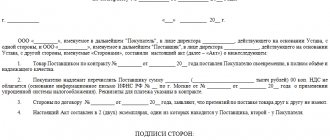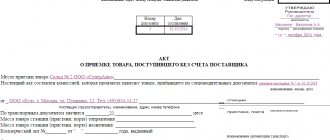Storage of primary documentation is a special requirement of the current Russian legislation in the field of accounting and tax accounting. It is necessary to ensure the safety of data for a specific period of time. If this is not done, then problems with the Federal Tax Service cannot be avoided. Let's figure out what documents and how long you need to store in order to prevent sanctions from controllers.
Any business operation in the life of an economic entity must be documented. Otherwise, the fact cannot be reflected in accounting. For these purposes, a separate category of documentation is provided - the primary document. A primary form is a form that defines the circumstances, conditions and characteristics of a specific fact of the economic life of an organization. Information from the primary forms is the basis for entering into accounting registers and then for drawing up financial statements. Also, the primary document confirms the correctness and legality of the calculation of taxes, fees and contributions.
This is why it is so important for an organization to ensure the safety of documents. Moreover, to achieve this goal, it has its own characteristics and requirements.
List of documents that need to be stored
The requirement to store accounting documents for periods established in accordance with the rules for organizing state archival affairs, but not less than 5 years after the reporting year, is enshrined in Art.
29 of the Law “On Accounting” dated December 6, 2011 No. 402-FZ. At the same time, the rules of archival affairs mean, first of all, the list of documents and their storage periods approved by Rosarkhiv (order No. 236 dated December 20, 2019, entered into force on February 18, 2020). The storage period for tax documents, reporting and annexes (additions) to it is also specified in the Tax Code. In particular, in Art. 23 of the Tax Code of the Russian Federation states that documents (tax and accounting) on the basis of which taxes were calculated should be stored for at least 4 years.
Important! ConsultantPlus warns The absence of documents necessary for the calculation and payment of taxes may result in prosecution for gross violation of the rules for accounting for income and (or) expenses and (or) objects of taxation established by clause 1 or clause 2 of Art. 120 Tax Code of the Russian Federation. And if the tax base is distorted, you face... Read more about liability in K+. Trial access is free.
A number of federal laws also contain clear instructions on the list of documents that must be retained for a certain period of time (or for a long period of time). So, in paragraph 1 of Art. 50 of the Law “On LLC” dated 02/08/1998 No. 14-FZ (hereinafter referred to as the Law on LLC) states that it is mandatory to preserve accounting documents among the constituent documentation:
- confirming the rights of the LLC to the property listed on its balance sheet;
- internal documentation of the business entity;
- documents on the issue of securities;
- other documentation, the need for storage of which is stipulated by federal laws, the charter of the economic company, and local regulations of the company.
In paragraph 1 of Art. 89 of the Law “On JSC” dated December 26, 1995 No. 208-FZ (hereinafter referred to as the Law on JSC) it is stated that among the mandatory storage of constituent documents the following accounting documentation is mentioned:
- documents confirming the company’s rights to assets that are listed on its balance sheet;
- all internal documentation;
- annual reports and other accounting documents;
- accounting documents;
- other documentation, the mandatory preservation of which is specified in the charter and/or local regulations.
You will find more information about what types of accounting documents are in the article “Unified forms of primary documents (list)”.
Limit periods for storing documents
In accordance with FCSM Resolution No. 03-33/ps dated July 16, 2003, JSCs have a retention period for accounting documentation of at least 5 years.
According to information from the list of Rosarkhiv:
- orders and instructions for the main type of activity must be kept permanently, for personnel - up to 75 years, for economic and administrative issues - up to 5 years;
- the staffing table is permanent, and job descriptions and staffing levels are up to 75 years;
- agreements on the transfer of rights to the results obtained from intellectual property - 5 years after the expiration of the agreement;
- documents that are prepared to obtain a license - up to 5 years, and the licenses themselves - permanently;
- documentation on the transfer of assets into trust management - 10 years;
- documents on transactions with securities - before the liquidation of the organization;
- documents on economic activities - 3–5 years;
- cases of archival storage of documents - permanently;
- annual statistical reports, estimates - constantly;
- documentation on long-term lending and investment activities - constantly;
- reports on the implementation of government orders - constantly;
- consolidated (annual) financial statements - constantly;
- declarations for all types of taxes - 5 years, etc.
You will find a complete guide to documentation retention periods in ConsultantPlus. Trial access to the legal system is free.
The fact that companies must comply with the legally established periods for storing accounting documentation is stated in letters from the Ministry of Finance dated March 30, 2012 No. 03-11-11-104 and dated July 22, 2013 No. 03-02-07/2/28610.
We recommend storing accounting documentation for at least 5 years so as not to fall under the sanctions of inspection authorities.
However, for some situations it is possible to use other storage periods:
- Documents accompanying the transaction for the capitalization of depreciable assets are stored for another 4 years after the property was written off the balance sheet as a result of liquidation/alienation (based on Article 23 of the Tax Code and letter of the Ministry of Finance dated April 26, 2011 No. 03-03-06/1 /270).
- Primary documentation for the unprofitable period of the company's operation must be stored for the entire period of time while the results of unprofitable activities are used to reduce income tax (based on Article 283 of the Tax Code and letter of the Ministry of Finance dated May 25, 2012 No. 03-03-06/1/278) .
- The initial document necessary to write off bad debts of debtors must be kept for another 4 years after the debt was recognized as bad. In this case, the storage period is extended if the statute of limitations on the debtors’ obligations was interrupted and began to be counted anew (the basis is subparagraph 2, paragraph 2, article 265 of the Tax Code and article 203 of the Civil Code of the Russian Federation).
The starting date for determining the storage period of accounting documentation is considered to be January 1 of the year that follows the period of its preparation/acceptance for accounting (Rosarkhiv order No. 237 dated December 20, 2019).
Features of storing various accounting documents
The rules for storing accounting documentation applied at the enterprise in accordance with current legislation should be prescribed in a separate local act. For such purposes, the provision on archiving documents is suitable.
In accordance with the adoption of a number of norms in domestic legislation, enterprises can use documentation in electronic form. Primary documentation can be stored in this form on the basis of Art. 9 of the Law on Accounting, accounting registers - Art. 314 of the Tax Code of the Russian Federation and tax reporting transmitted via electronic communication.
Electronic documents must be certified with a digital signature - this is stated in the letter of the Ministry of Finance dated August 22, 2012 No. 03-02-07/1-202. But if a request is received from the inspector to provide such documentation in printed form, it must be printed by the taxpayer and certified in accordance with all the rules. The storage periods for electronic documentation are the same as for analogues in printed form.
Information on storing personnel documentation is contained in the article “What is the storage period for personnel documents in an organization?”
Where should accounting documents be stored?
Accounting documents related to the business activities of the LLC must be stored at the address where the sole executive body is located or in a place that is known and where all members of the company can get (clause 2 of Article 50 of the LLC Law). As for accounting documentation and other documents of joint-stock companies, it must be stored at the location of the executive body (clause 2 of Article 89 of the Law on JSC).
Documentation should be stored in a specially equipped room or closed cabinets (clause 6.2 of the letter of the Ministry of Finance dated July 29, 1983 No. 105). How to arrange such storage facilities is discussed in detail in the rules, which were approved by the decision of the Rosarkhiv board of 02/06/2002.
Cover design
Also, identification details are placed on the cover of each case: number, title, reporting period and a special archival index. The archiving of accounting documents is completed by drawing up a general inventory of the compiled cases. Such a serious and labor-intensive process as archiving accounting documents requires knowledge of archival science for a high-quality result. For people who do not have the necessary skills, it takes an unreasonably long time and often does not provide the required level of quality. In most cases, it makes more sense to entrust archiving of your accounting documents to professionals.
How to prepare documents for archiving?
An archive can be called a special room in a company’s office reserved for storing documentation, a structural unit of an enterprise as part of an office/records service, as well as a specialized government agency. Documents with a shelf life of at least 10 years are transferred for archival storage. Documents that can be stored for a shorter period of time can be kept in the accounting department until they are destroyed.
To transfer accounting documentation to the archive, you will need to perform a number of actions (clause 3.4.2 of the order of the Main Archive of the USSR dated May 25, 1988 No. 33), including:
- drawing up an inventory;
- numbering pages and stapling the case;
- cover design.
If the enterprise has already undergone inspections by fiscal and other regulatory authorities, then documentation that does not fit in the office can be transferred to the archive. To transfer documents to the state archive (municipal archive), they must be formed into files. Documents are accepted according to the inventory.
If the storage period for documents has expired, they are usually destroyed, having previously created a commission for this purpose.
You will find details about the procedure for destroying documentation in our article “Destruction of documents with expired storage periods (act).”
Certificates of completed work
Sooner or later, the heads of the organization, as well as the heads of planning and economic departments, are faced with the issue of storing and disposing of documentation, in particular, certificates of work performed.
What are their storage periods and who is responsible for it?
Domestic legislation obliges business entities, regardless of legal form of ownership, to ensure the safety of internal documentation. In particular, it regulates the procedure and terms of storage of certificates of work performed and services provided, ignoring and non-compliance with which is fraught with penalties applied to the organization.
Results
The rules for storing accounting documentation are contained in a number of regulations, among which are the Accounting Law and the Tax Code of the Russian Federation. Failure to comply with the storage deadlines for documents (their early destruction) is fraught with additional taxes and fines.
Sources:
- Federal Law of December 6, 2011 No. 402-FZ
- Federal Law of 02/08/1998 No. 14-FZ
- Federal Law of December 26, 1995 No. 208-FZ
- Order of the Federal Archive Agency dated December 20, 2019 No. 236
- Order of the Federal Archive Agency dated December 20, 2019 No. 237
- Basic Rules for the work of archives of organizations (approved by the decision of the Board of Rosarkhiv dated 02/06/2002)
You can find more complete information on the topic in ConsultantPlus. Free trial access to the system for 2 days.
Is it necessary to attract outside specialists?
Involving third-party organizations that perform archiving for a fee is advisable in several cases:
- the volume of documentation for archiving is large, it is impossible to do this using the company’s employees without damaging production and management processes;
- the organization creates an electronic archive; in addition to the large amount of work, the problem may be the loss of time for employees to master new software;
- documents are transferred externally, for example, for storage in the state archive, and an increased level of specialist competence is required.
Important! Violation of archiving rules is an administrative offense. The Code of Administrative Offenses (Article 13.25) provides for fines: for the responsible person - 2.5-5 thousand rubles, for a legal entity - 200-300 thousand rubles.






